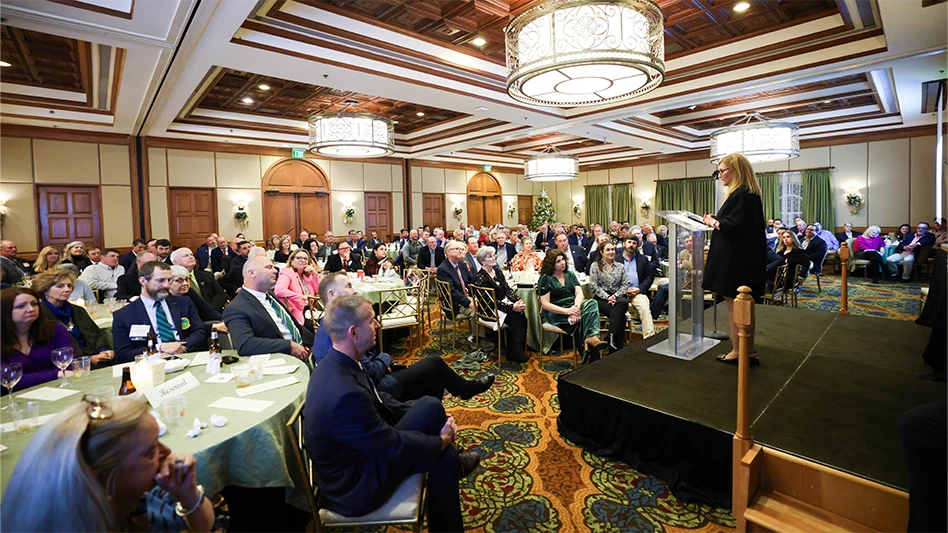 Leave. Flee. Go. Turn off the cell phone. Let the computer sleep. Forget about that long to-do list established months ago. The person below you in the agronomy hierarchy doesn’t mind it when you take a rare multi-day break. While we’re being upfront, we’ll reveal a secret: your assistant likely relishes the challenge of leading the department when you need a respite.
Leave. Flee. Go. Turn off the cell phone. Let the computer sleep. Forget about that long to-do list established months ago. The person below you in the agronomy hierarchy doesn’t mind it when you take a rare multi-day break. While we’re being upfront, we’ll reveal a secret: your assistant likely relishes the challenge of leading the department when you need a respite.
Part of becoming the boss involves learning how to handle situations and make decisions when the boss leaves town or shuts down. Entrusting an assistant to make the final decisions for a few days can yield benefits for superintendents and assistants.
“I think it works in both ways,” says Cameron Watt, assistant superintendent at The Redwoods Golf Course in Langley, British Columbia. “For me, it helps me know that I can make a decision and it helps my boss know that he can trust me to make decisions.”
Breaks are needed at Redwoods. The 18-hole course 30 minutes from Vancouver markets itself as a place to play golf 365 days per year. The course receives snow, but play is encouraged shortly after it melts.
Watt has spent 16 months working with superintendent Peter Szarka at Redwoods. The course is Watt’s third stop as an assistant, and he landed in British Columbia after a flood forced his previous course, Kananaskis Country Golf Course in Alberta, to close.
Past experiences allowed Watt to make a bold, yet thorough decision when Szarka took time off last winter. A disease had quickly spread on a fairway. To complicate matters, Redwoods’ treatment stock had been depleted. Watt couldn’t immediately reach Szarka. Instead of fretting, Watt treated the area using existing products in stock. “I just made the call,” he says. “It was getting worse. I just went through the reasoning in my head, why I should make the call, the pros and cons.” And what happened? “It worked out,” he says.
In South Florida, where temperatures reach triple digits and storms plow through coastal settings, water-related decisions require immediate action. Too little water can wilt greens. Too much water can cause turf diseases.
Troy Hall, assistant superintendent at Indian Creek Country Club in Miami Beach, Fla., leans on past experiences, regular dialogue with longtime superintendent Joe Pantaleo and technology. Hall worked at The Club at Mediterra and Trump National Doral before arriving at Indian Creek, and he doesn’t get nervous when Pantaleo leaves. Indian Creek receives most of its play from January-April. If Pantaleo leaves, it’s usually in the summer, when conditions reach extremes.
“Irrigation is the most important thing when he’s gone,” Hall says. “The greens can get real hot, real quick when it’s 95 degrees. When you get a ton of rain, you have to keep your eyes open for disease. It can happen real quick if you don’t see the problem. Now the technology is so good. You can take pictures, and send emails and texts with pictures. There are a lot of people out there to help you identify things.”
Kyle DeNuys, assistant superintendent at North Jersey Country Club, says disease and summer irrigation decisions are key calls to make when his supervisor can’t be reached. But 12 years in the business and two previous assistant superintendent jobs offer guidelines for making sound agronomic decisions. “As far as agronomical, I haven’t run into anything where it’s been like, ‘Oh, I don’t know what to do,’” DeNuys says.
DeNuys arrived at North Jersey last summer and found himself in an odd situation when the superintendent who hired him, Dave Dudones, left the club for a position at Westchester Country Club. Tyler Otero replaced Dudones, and DeNuys established a call-often, text-frequently relationship with his new boss. That relationship should benefit DeNuys if he’s forced to make what he considers a tricky member-related decision such as giving the pro shop permission to allow play to begin 15 minutes earlier than normal, thus setting a precedent of earlier tee times. “That’s something I would be leery of because I would like to talk to him before making that decision,” DeNuys says.
Most superintendents stay wired when they leave the course. Jeff Corcoran, manager of golf courses and grounds at Oak Hill Country Club in Rochester, N.Y., calls assistants and requests daily update emails. Before leaving the club for an extended period, Corcoran also compiles lengthy to-do lists for his assistants. Oak Hill is a renowned 36-hole facility that has hosted multiple major tournaments, including the 2013 PGA Championship. In short, missteps are magnified.
Corcoran considers his absences opportunities for assistants to prove themselves.Solid work when Corcoran isn’t around can help an assistant advance his or her career.
“I would like to see that they get some stuff done that was on their short list that wasn’t on mine,” he says. “It’s kind of cool to see how they do. I have had situations where I have gone away and come back to a bomb and I’ve had situations where they have done more than I ever expected them to get done.”
Chris Condon, the only superintendent since Tetherow Golf Club in Bend, Ore., opened in 2008, operated as a stay-at-home superintendent early in his career. His ways are changing as his career progresses. Last month, Condon left Oregon for three days to participate in Green Start Academy as a guest presenter. When he’s not at the course, tries to stay away from work “as much as possible,” although he makes himself available to assistants when technology permits. “I say let them deal with it, because that’s the only way they are going to learn,” he says.
Patrick Brey, the assistant superintendent at Aspen Glen Club in Carbondale, Colo., calls it a “normal day” when superintendent Jake Falke leaves town. A drainage ditch that sometimes overfills and causes water to enter the property creates dilemmas at Aspen Glen. But Brey has spent six years at the club, giving him a solid knowledge of the problems associated with the ditch and a base to formulate decisions when he can’t reach Falke. “I can handle things when he’s around and when’s not around,” Brey says. “The expectations don’t change. It’s the same.”
Guy Cipriano is GCI’s assistant editor.

Explore the November 2014 Issue
Check out more from this issue and find your next story to read.
Latest from Golf Course Industry
- Golf Construction Conversations: Reed Anderson
- ’Twas the Night Before Christmas (on turf)
- Twas the Night Before Christmas (the turf version audio)
- Advanced Turf Solutions and The Aquatrols Company release soil surfactant
- Heritage Golf Group acquires North Carolina courses
- Editor’s notebook: Green Start Academy 2024
- USGA focuses on inclusion, sustainability in 2024
- Greens with Envy 65: Carolina on our mind





